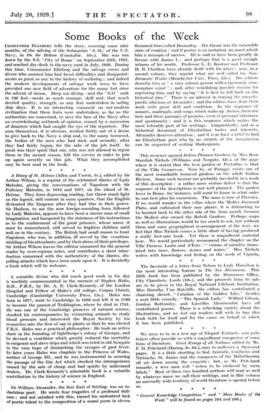A scientific divine who did much good work in his
day is worthily commemorated in the memoir of Stephen Hales, D.D., F.R.S., by Dr. A. E. Clark-Kennedy, of the London Hospital and Fellow of Hales's old college, Corpus Christi, Cambridge (Cambridge University Press, 15s.). Hales was born in 1677, went to Cambridge in 1696 and left it in 1709 to become the parson of Teddington, where he died in 1761. He was one of the Cambridge pioneers of natural science, shocked his contemporaries by vivisecting animals to study blood pressure and interested the Royal Society by his researches into the flow of sap in plants so that he was elected F.R.S. Hales was a practical philosopher. He took an active share in the founding of Oglethorpe's colony of Georgia, and he devised a ventilator which greatly reduced the mortality in emigrant and slave ships and which was tried in old Newgate in the vain hope of diminishing the ravages of gaol fever. In later years Hales was chaplain to the Princess of Wales, mother of George III., and he was instrumental in securing the passage of the Gin Act which checked the intemperance caused by the sale of cheap and bad spirits by unlicensed dealers. Dr. Clark-Kennedy's admirable book is a valuable contribution to the history of science in England.
















































 Previous page
Previous page